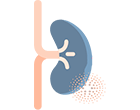Bartter Syndrome Precision Panel
Bartter Syndrome is an autosomal recessive renal tubular disorder caused by a defective salt reabsorption in the thick ascending loop of Henle resulting in hypokalemia, hypochloremia, metabolic alkalosis, high renin and aldosterone with normal blood pressure.




